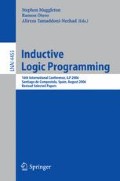Abstract
Requirements Engineering involves the elicitation of high-level stakeholder goals and their refinement into operational system requirements. A key difficulty is that stakeholders typically convey their goals indirectly through intuitive narrative-style scenarios of desirable and undesirable system behaviour, whereas goal refinement methods usually require goals to be expressed declaratively using, for instance, a temporal logic. Currently, the extraction of formal requirements from scenario-based descriptions is a tedious and error-prone process that would benefit from automated tool support. We present an ILP methodology for inferring requirements from a set of scenarios and an initial but incomplete requirements specification. The approach is based on translating the specification and scenarios into an event-based logic programming formalism and using a non-monotonic ILP system to learn a set of missing event preconditions. The contribution of this paper is a novel application of ILP to requirements engineering that also demonstrate the need for non-monotonic learning.
Access this chapter
Tax calculation will be finalised at checkout
Purchases are for personal use only
Preview
Unable to display preview. Download preview PDF.
References
Alrajeh, D., Russo, A., Uchitel, S.: Inferring operational requirements from goal models and scenarios using inductive systems. In: Proc. 5th Int. Workshop on Scenarios and State Machines (2006)
Dardenne, A., Lamsweerde, A.v., Fickas, S.: Goal-directed requirements acquisition. Science of Computer Programming 20 (1), 3–50 (1993)
Eshghi, K., Kowalski, R.A.: Abduction compared with negation by failure. In: Levi, G., Martelli, M. (eds.) Proc. of the 6th Int. Conf. on Logic Programming, pp. 234–254 (1989)
Gelfond, M., Lifschitz, V.: The stable model semantics for logic programming. In: Kowalski, R.A., Bowen, K. (eds.) Proc. of the 5th Int. Conf. on Logic Programming, pp. 1070–1080. MIT Press, Cambridge (1988)
Giannakopoulou, D., Magee, J.: Fluent model checking for event-based systems. In: Proc. 11th ACM SIGSOFT Symp. on Foundations Software Engineering, ACM Press, New York (2003)
Huth, M., Ryan, M.D.: Logic in Computer Science: Modelling and Reasoning about systems. Cambridge University Press, Cambridge (2000)
Kakas, A.C., Kowalski, R.A., Toni, F.: Abductive Logic Programming. Journal of Logic and Computation 2(6), 719–770 (1992)
Kowalski, R.A., Sergot, M.: A logic-based calculus of events. New generation computing 4(1), 67–95 (1986)
Kramer, J., Magee, J., Sloman, M.: Conic: An integrated approach to distributed computer control systems. In: IEE Proc., Part E 130, pp. 1–10 (January 1983)
Lamsweerde, A.V.: Goal-oriented requirements engineering: A guided tour. In: Proc. 5th IEEE Int. Symp. on Requirements Engineering, pp. 249–263. IEEE Computer Society Press, Los Alamitos (2001)
Lamsweerde, A.V., Willemet, L.: Inferring declarative requirements specifications from operational scenarios. IEEE Trans. on Software Engineering 24(12), 1089–1114 (1998)
Letier, E., Kramer, J., Magee, J., Uchitel, S.: Deriving event-based transitions systems from goal-oriented requirements models. Technical Report 2006/2, Imperial College London (2005)
Letier, E., Lamsweerde, A.V.: Deriving operational software specifications from system goals. In: Proc. 10th ACM SIGSOFT Symp. on Foundations of Software Engineering, pp. 119–128. ACM Press, New York (2002)
Lorenzo, D.: Learning non-monotonic Logic Programs to Reason about Actions and Change. PhD thesis, University of Coruna (2001)
Magee, J., Kramer, J.: Concurrency: State Models and Java Programs. John Wiley and Sons, Chichester (1999)
Manna, Z., Pnueli, A.: The Temporal Logic of Reactive and Concurrent Systems. Springer, Heidelberg (1992)
Miller, R., Shanahan, M.: Some alternative formulation of event calculus. Computer Science: Computational Logic: Logic programming and Beyond 2408 (2002)
Moyle, S.: An investigation into Theory Completion Techniques in ILP. PhD thesis, University of Oxford (2000)
Moyle, S., Muggleton, S.: Learning programs in the event calculus. In: Proc. 7th Int. Workshop on ILP (1997)
Muggleton, S.H.: Inverse Entailment and Progol. New Generation Computing, Special issue on Inductive Logic Programming 13(3-4), 245–286 (1995)
Otero, R.: Embracing causality in inducing the effects of actions. In: Proc. 10th Conf. of the Spanish Assoc. for AI (2004)
Otero, R., Gonzalez, J.: Iaction: a system for induction under non-horn programs with stable models. In: Proc. of the 16th Int. Conf. on ILP, volume submitted of Lecture Notes in Artificial Intelligence (2006)
Otero, R., Varela, M.: Iaction: a system for learning action descriptions for planning. In: Proc. of the 16th Int. Conf. on ILP, volume submitted of Lecture Notes in Artificial Intelligence (2006)
Ray, O.: Hybrid Abductive-Inductive Learning. PhD thesis, Imperial College London (2005)
Ray, O.: Using abduction for induction of normal logic programs. In: Proc. of the ECAI 2006 Workshop on Abduction and Induction in AI and Scientific Modelling, pp. 28–31 (2006)
Ray, O., Kakas, A.: Prologica: a practical system for abductive logic programming. In: Dix, J., Hunter, A. (eds.) 11th International Workshop on Non-monotonic Reasoning. IFL Technical Report Series, pp. 304–312 (2006)
Russo, A., Miller, R., Nuseibeh, B., Kramer, J.: An abductive approach for analysing event-based requirements specifications. In: Stuckey, P.J. (ed.) ICLP 2002. LNCS, vol. 2401, pp. 22–37. Springer, Heidelberg (2002)
Sakama, C.: Induction from answer sets in non-monotonic logic programs. ACM Trans. on Computational Logic 6(2), 203–231 (2005)
Shanahan, M.P.: Solving the Frame Problem. MIT Press, Cambridge (1997)
Sutcliffe, A., Maiden, N.A.M., Minocha, S., Manuel, D.: Supporting scenario-based requirements engineering. IEEE Trans. on Software Engineering 24, 1072–1088 (1998)
Author information
Authors and Affiliations
Editor information
Rights and permissions
Copyright information
© 2007 Springer-Verlag Berlin Heidelberg
About this paper
Cite this paper
Alrajeh, D., Ray, O., Russo, A., Uchitel, S. (2007). Extracting Requirements from Scenarios with ILP. In: Muggleton, S., Otero, R., Tamaddoni-Nezhad, A. (eds) Inductive Logic Programming. ILP 2006. Lecture Notes in Computer Science(), vol 4455. Springer, Berlin, Heidelberg. https://doi.org/10.1007/978-3-540-73847-3_14
Download citation
DOI: https://doi.org/10.1007/978-3-540-73847-3_14
Publisher Name: Springer, Berlin, Heidelberg
Print ISBN: 978-3-540-73846-6
Online ISBN: 978-3-540-73847-3
eBook Packages: Computer ScienceComputer Science (R0)

